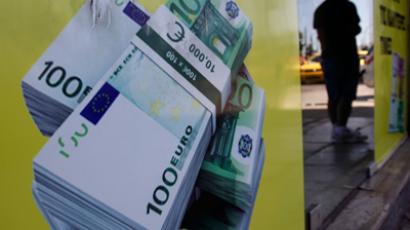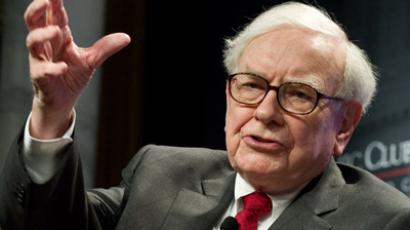No EU state can afford end of Euro now – ex-EU Counsel
The question facing the EU is no longer whether or not to use the Euro, because a collapse would be catastrophic, endangering the Union and leading to a currency-devaluation war, former top EU legal adviser Jean-Claude Piris told RT.
The time has come for a decision, the former Legal Counsel of the European Council says, which must be made in the coming weeks and months, not years. Desperate economic conditions have already forced many EU member-states to make concessions to populist-nationalist political parties, Piris adds.RT: You have said that the EU formation was too quick. Is there is something fundamentally wrong with Europe at this point?Jean-Claude Piris: This whole European Union adventure is something which is new and has never been made in history. So the problems we’re currently experiencing are another example of that. We thought in the beginning that we had delegations of national parliaments coming to Brussels to bring democratic legitimacy. We thought that making all members of the EU parliament directly elected by people will bring more democratic legitimacy. It worked, but not for all persons. For example the turnout for the elections has been decreasing a lot. So that’s one of the problems we’re experiencing with this new adventure.RT: There is a question of sovereignty of individual member-states. Are states giving more powers to Brussels?JCP: The member-states of the EU, a lot of them are old nation-states with a lot of history, culture and civilization behind them. So, it’s difficult for these states – like Greece, Spain, Portugal or France – to share powers with others. But I think it is also a necessity in the modern world. First of all we’ve been the EU in order to have peace between us because we’ve been fighting wars all the time throughout history. And then we’ve decided to have more prosperity together, to build an internal market among us which has 500 million consumers, and then other policies.RT: There’s a notion always presented by the EU, that there will be no wars, there will be peace. But if we look at the economic situation of individual EU member-states, this isn’t exactly a conducive recipe for peace, is it?JCP: If I may, I totally disagree with you. No member-state would be in the EU if it was not in its interests to stay. These states are there because they think that the EU is helping. If not, they will leave. Simply saying, the EU is a creation of these states.RT: Are you worried about the growing social unrest in the EU as well as the rise of the extreme political left and right?JCP: Of course. That is why for the last year and a half I’m trying to give them a little grain of sand into the discussions and try to accelerate the way we’re taking decisions to finish with the Euro crisis. We cannot go on with austerity in some countries without giving hope to the people. It is just not possible. The people are desperate. Their revenues are falling, unemployment is increasing and so on and so forth. We have a heavy price paid to populist political parties because of that. Then you have reactions of the people on the streets which are completely understandable. They have no hope at all. So I think we have to give hope to these people. And to take decisions visible, credible and understandable as soon as possible. And now it’s obvious we cannot go on with a simple pact. We need a strong course, legally binding rules for the member-states to follow and to have a lot of convergence of their budget and economic policies in order to establish a real EU economic and monetary union. RT: But we’ve had these rules before. You just added new rules as those old rules didn’t really help, did they?JCP: No, we did not have those rules. We didn’t say that every national budget you’re going to make, we’re going to say ‘yes’ or ‘no’ before you’re going to be able to accept it. We haven’t said before that before taking any economic policies of import you have to discuss and have a green light of your companions in the common currency. That’s all the work we have to do now. The work we’ve done over last two years is not enough, we must go much further.RT: But isn’t it precisely the EU taking more powers from individual member-states that is creating this resistance from the EU member states?JCP: It is control by the Euro companions who are in the same boat. We’re a team of alpinists climbing a mountain that are linked together. We’re rowing in the same boat. If one is failing, the others will probably fail, too. It’s a team. We’re sharing the powers, we’re deciding together and no one should be the weakest link, which might bring a catastrophe. RT: How long will people have to bear the brunt of the consequences of the Euro crisis we’re in?JCP: I do think the time has come to take the final decisions. For me it’s a question of weeks or month, not years.RT: Do we really need the Euro to pursuit this European project?JCP: This is not the question. We have the Euro. This question was 20 years ago, it has been solved by people, governments, parliaments, and they have chosen the currency. Now that we have the currency, what would happen if the Euro exploded? That would be total catastrophe. Not only for Greece, Portugal and so on. The country that has been probably benefiting the most from the euro is Germany. And that would be a catastrophe for Germany. If you look at their trade again, of course they do a lot of trade with China, but in the global picture China is only a tiny part of their external trade. Most of their trade is done in Europe. If the Euro explodes, what would be the consequence? Some new currencies will devaluate, there would be a war of devaluations. And there would be a great danger for the internal market and the European Union and European integration as such. Do you think that the members of Merkel government [in Germany] or the Holland government [in France] will take the responsibility to go towards this fate? I don’t think so.RT: One of the pillars of the EU is free movement of people, no internal borders, but there have been a lot of talk about strengthening border controls, a rise of anti-immigration rhetoric. Where does that leave Europe? JCP: First, we have this freedom of movement, but actually a number of workers going from one country to another is unfortunately quite weak, because of the language, mainly, but also because of the attachment of people to their regions. We have to take all decisions we can to improve the mobility of labor within the Union. I’m proposing some measure on this.Another thing is immigration from third-world countries. You know about the demographic trend in the countries of the European Union. They are just catastrophic. Such as in Russia and other countries as well. That means we have older people and less young people to support them. So we need this immigration from other countries. And we have to have a common policy on that among European countries.RT: What about military spending, particularly in regard to Syria? If France allocates money on military intervention in Syria, how will it affect the Union's economy?JCP: Libya was one thing, Syria is another thing. It’s a much bigger country. I don’t see an intervention of the EU as such in Syria. Would we have the means to do that? I doubt it also. Because of the economic crisis the military expenditures have decreased a lot in all European countries. Libya has shown that we have difficulty in having operations outside our territory.














